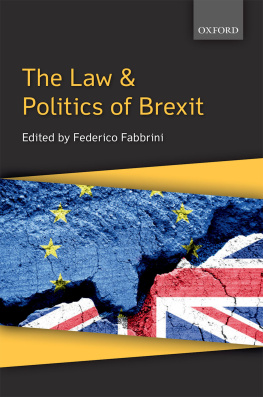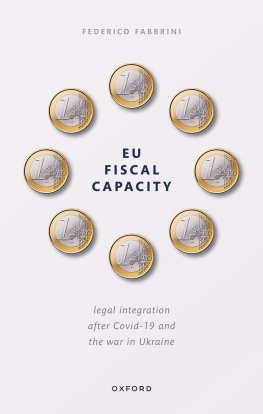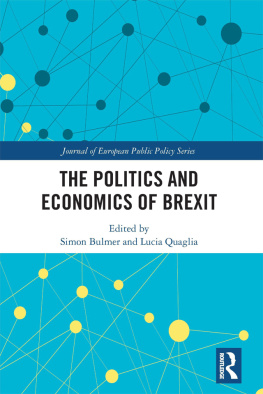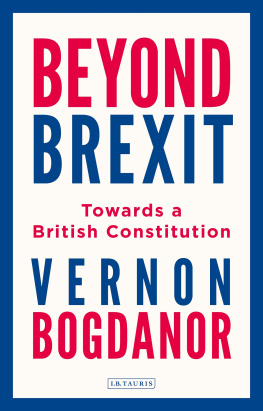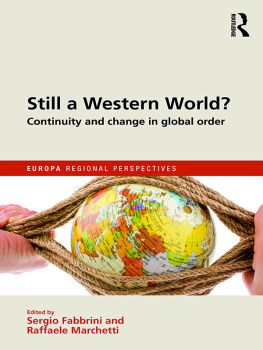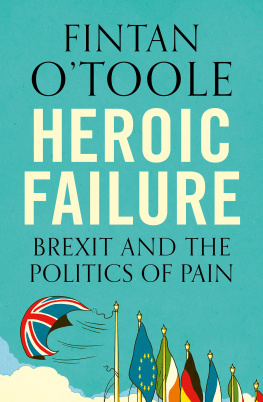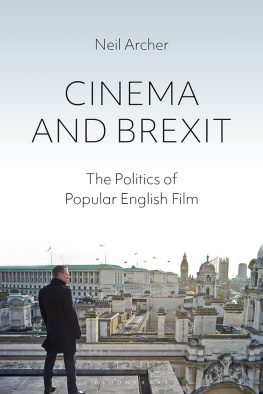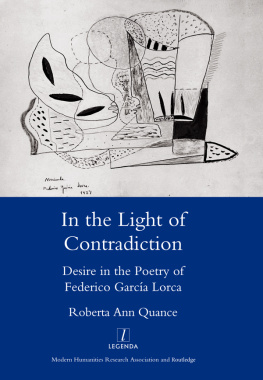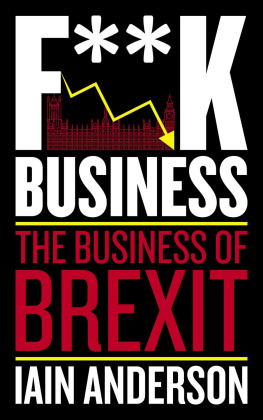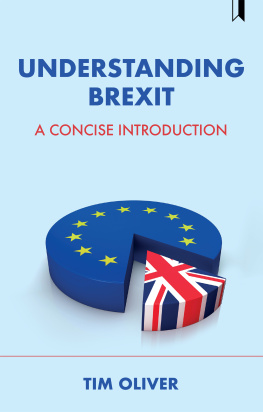Federico Fabbrini - The Law & Politics of Brexit
Here you can read online Federico Fabbrini - The Law & Politics of Brexit full text of the book (entire story) in english for free. Download pdf and epub, get meaning, cover and reviews about this ebook. year: 2017, publisher: Oxford University Press, genre: Science / Business. Description of the work, (preface) as well as reviews are available. Best literature library LitArk.com created for fans of good reading and offers a wide selection of genres:
Romance novel
Science fiction
Adventure
Detective
Science
History
Home and family
Prose
Art
Politics
Computer
Non-fiction
Religion
Business
Children
Humor
Choose a favorite category and find really read worthwhile books. Enjoy immersion in the world of imagination, feel the emotions of the characters or learn something new for yourself, make an fascinating discovery.
- Book:The Law & Politics of Brexit
- Author:
- Publisher:Oxford University Press
- Genre:
- Year:2017
- Rating:4 / 5
- Favourites:Add to favourites
- Your mark:
- 80
- 1
- 2
- 3
- 4
- 5
The Law & Politics of Brexit: summary, description and annotation
We offer to read an annotation, description, summary or preface (depends on what the author of the book "The Law & Politics of Brexit" wrote himself). If you haven't found the necessary information about the book — write in the comments, we will try to find it.
The Law & Politics of Brexit — read online for free the complete book (whole text) full work
Below is the text of the book, divided by pages. System saving the place of the last page read, allows you to conveniently read the book "The Law & Politics of Brexit" online for free, without having to search again every time where you left off. Put a bookmark, and you can go to the page where you finished reading at any time.
Font size:
Interval:
Bookmark:


Great Clarendon Street, Oxford, OX2 6DP, United Kingdom
Oxford University Press is a department of the University of Oxford. It furthers the Universitys objective of excellence in research, scholarship, and education by publishing worldwide. Oxford is a registered trade mark of Oxford University Press in the UK and in certain other countries
The Several Contributors 2017
The moral rights of the author have been asserted
First Edition published in 2017
Impression: 1
All rights reserved. No part of this publication may be reproduced, stored in a retrieval system, or transmitted, in any form or by any means, without the prior permission in writing of Oxford University Press, or as expressly permitted by law, by licence or under terms agreed with the appropriate reprographics rights organization. Enquiries concerning reproduction outside the scope of the above should be sent to the Rights Department, Oxford University Press, at the address above
You must not circulate this work in any other form and you must impose this same condition on any acquirer
Crown copyright material is reproduced under Class Licence Number C01P0000148 with the permission of OPSI and the Queens Printer for Scotland
Published in the United States of America by Oxford University Press
198 Madison Avenue, New York, NY 10016, United States of America
British Library Cataloguing in Publication Data
Data available
Library of Congress Control Number: 2017950759
ISBN 9780198811763 (hbk.)
ISBN 9780198810438 (pbk.)
ISBN 9780192539809 (epub)
Links to third party websites are provided by Oxford in good faith and for information only. Oxford disclaims any responsibility for the materials contained in any third party website referenced in this work.
Federico Fabbrini
Kalypso Nicoladis
Paul Craig
Giorgio Sacerdoti
Stephen Tierney
Sionaidh Douglas-Scott
John Doyle and Eileen Connolly
Michele Chang
Deirdre Curtin
Catherine Barnard
Marlene Wind
Uwe Puetter
Federico Fabbrini
Danuta Hbner
It is undeniable that the referendum of 23 June 2016 opened a new stage in European, as well as British politics, marred by uncertainty and, possibly, varying degrees of expectations, both on the part of the EU and the UK. The negotiations concerning the terms of leaving the Union by one of its important members will be complex and challenging.
Although ostensibly focused on intricate points of law, they will not be detached from the vagaries of politics. For it is quite obvious to everybody that recourse to a referendum did not appear as a result of immaculate conception, but was an outcome of political calculation on the part of the Conservative Party and Prime Minister David Cameron. It turned out that what was to be just a ploy in the internal British game became a historical fact that is about to change the political landscape of the United Kingdom as well as that of the European Union for generations to come.
As someone said: Be careful what you wish for. Wishes are brutal, unforgiving things.
And now, one year after that fateful decision, here we are, in the unforgiving world of Brexit and its unpredictable politics, beginning the most difficult negotiations of contemporary history. Their outcome is highly uncertain for the EU, the UK and, most importantly, our citizens. And yet the parties should be wary of entering the negotiations with trepidation and ill-feeling, because this would diminish their ability to lead the process in an orderly fashion. The process itself is complex enough and no additional burden need be added to it.
Both the EU and the UK must do everything to reduce the uncertainty that will accompany the difficult negotiations ahead.
On this point, it is of prime importance that everything should be done to protect the interests of all who are or will be affected by the negotiations. I mean here, first and foremost, the citizens of both the EU and the UK. The Union is the Union of citizens. They should not live in fear of losing their rightsalso their right to transparent negotiations that would have consequences for them and their families.
One year on, apart from putting our minds to the difficult task of negotiating ahead, coming out of the initial shock and starting to absorb its consequences, is the right moment to begin to understand why Brexit did actually happen, what led to it, as well as to look at what lies before us. Negotiations are one thing, and complex enough. But also, in the EU, Brexit challenges us with developing a quite new set of constitutional questions, and a necessity of finding further possible paths for national and European development and integration.
Brexit, thus, as a sui generis phenomenon, is not only a brutal political reality, but also an inviting object of multi-faceted scholarly investigation in the areas of British and European politics, economics, law, as well as cultural studies. In time, certainly many volumes will appear on the causes, motives, and (mis)calculations that led to Brexit, as well as on the negotiating process itself.
The book that you have in your hands is the first comprehensive study that makes it easier for the reader to comprehend the complexity of the law and politics of Brexit. It is an indispensable compendium of knowledge on all key substantial issues that will impinge on the new post-Brexit settlement in Britain and in the European Union.
Leading political scientists, lawyers, and economists, under the capable editorship of Professor Federico Fabbrini, have taken up the task of explaining why Brexit happened, what are the prospects for the negotiations, what are the regional and European ramifications, and what all this means for the future of Europe, beyond Brexit.
There is a wealth of expertise here, which will certainly turn out to be a treasure trove for all scholars, students, and practitioners of European and British politics, its past, present, and future.
This volume is the result of a research project I have undertaken since my appointment as a Full Professor of Law at the School of Law & Government of Dublin City University (DCU)ironically, on the day of the Brexit referendum. Special thanks are due to Alex Flach and his team at Oxford University PressNatasha Flemming, Natalie Patey, and Liz Daveyfor making sure the publication of this volume could happen in record time. The book chapters were first presented at a Conference hosted at DCU on April 2021, 2017. The Conference was opened by Charles Flanagan (then Minister for Foreign Affairs and Trade of Ireland) and concluded by Danuta Hbner (President of the Constitutional Affairs Committee of the European Parliament)who honored us by kindly agreeing to write the Foreword to the volume. The DCU Conference was made possible by the generous sponsorship of a number of partners: the Bertelsmann Stiftung in Gtersloh, Germany; the Centro Studi sul Federalismo in Turin, Italy; the Reinholdt W Jork og Fond in Copenhagen, Denmark; and Matheson Law Firm, in Dublin, Ireland. A special thank you goes to Joe Beashel, Flavio Brugnoli, Katharina Gnath, Tim Scanlon, and Stefani Weiss for their trust and engagement. My friends Graham Butler, from the University of Aarhus and Matteo Scotto from Villa Vigoni (the Italian-German Center of European Excellence) also contributed materially and immaterially to the event at DCU, and I want to thank them warmly here.
Font size:
Interval:
Bookmark:
Similar books «The Law & Politics of Brexit»
Look at similar books to The Law & Politics of Brexit. We have selected literature similar in name and meaning in the hope of providing readers with more options to find new, interesting, not yet read works.
Discussion, reviews of the book The Law & Politics of Brexit and just readers' own opinions. Leave your comments, write what you think about the work, its meaning or the main characters. Specify what exactly you liked and what you didn't like, and why you think so.

